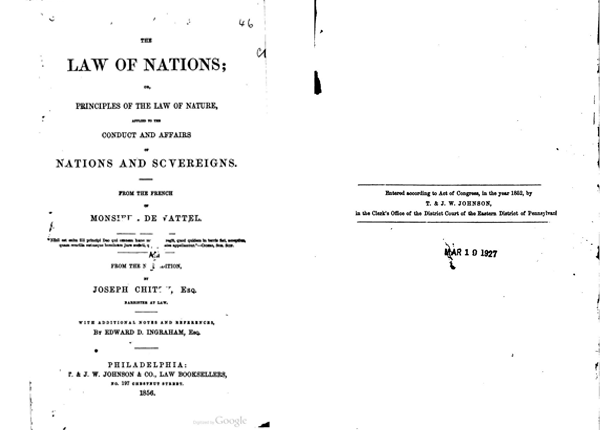Historic Document
The Law of Nations (1758)
Emmerich de Vattel | 1758

Public domain
Summary
Emmerich de Vattel (1714-67) was the author of The Law of Nations (1758). Swiss-born Vattel’s most famous work consisted of the application of the law of nature to nations. He understood the law of nature as accessible by human reason, according to which both individuals and political societies are capable of understanding their rights and obligations. Introduced into the American colonies in the 1760s, Vattel’s teachings about international law and sovereignty were not only carefully studied by American statesmen but applied by them in the international arena.
Selected by

Paul Rahe
Professor of History and Charles O. Lee and Louise K. Lee Chair in the Western Heritage at Hillsdale College

Jeffrey Rosen
President and CEO, National Constitution Center

Colleen A. Sheehan
Professor of Politics at the Arizona State University School of Civic and Economic Thought and Leadership
Document Excerpt
PRELIMINARIES Idea and general Principles of the Law of Nations.
Nations being composed of men naturally free and independent, and who, before the establishment of civil societies, lived together in the state of nature,—nations or sovereign states are to be considered as so many free persons living together in the state of nature.
It is a settled point with writers on the natural law, that all men inherit from nature a perfect liberty and independence, of which they cannot be deprived without their own consent. In a state, the individual citizens do not enjoy them fully and absolutely, because they have made a partial surrender of them to the sovereign. But the body of the nation, the state, remains absolutely free and independent with respect to all other men, all other nations, as long as it has not voluntarily submitted to them.
§5. To what laws nations are subject. As men are subject to the laws of nature,—and as their union in civil society cannot have exempted them from the obligation to observe those laws, since by that union they do not cease to be men,—the entire nation, whose common will is but the result of the united wills of the citizens, remains subject to the laws of nature, and is bound to respect them in all her proceedings. And since right arises from obligation, as we have just observed (§3), the nation possesses also the same rights which nature has conferred upon men in order to enable them to perform their duties.
§6. In what the law of nations originally consists. We must therefore apply to nations the rules of the law of nature, in order to discover what their obligations are, and what their rights: consequently the law of nations is originally no other than the law of nature applied to nations. But as the application of a rule cannot be just and reasonable unless it be made in a manner suitable to the subject, we are not to imagine that the law of nations is precisely and in every case the same as the law of nature, with the difference only of the subjects to which it is applied, so as to allow of our substituting nations for individuals. A state or civil society is a subject very different from an individual of the human race: from which circumstance, pursuant to the law of nature itself, there result, in many cases, very different obligations and rights; since the same general rule, applied to two subjects, cannot produce exactly the same decisions, when the subjects are different; and a particular rule which is perfectly just with respect to one subject, is not applicable to another subject of a quite different nature. There are many cases, therefore, in which the law of nature does not decide between state and state in the same manner as it would between man and man. We must therefore know how to accommodate the application of it to different subjects; and it is the art of thus applying it with a precision founded on right reason, that renders the law of nations a distinct science.




